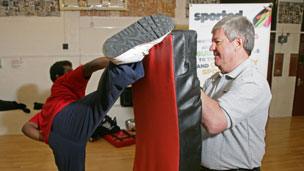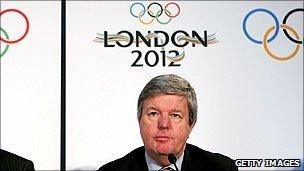London 2012 chief's sports development charity
- Published

Sir Keith Mills at one of the sporting projects supported by Sported
Sir Keith Mills has worn a number of sporting hats in his time - deputy chair of the London 2012 Olympic organising committee, non-executive director of Tottenham Hotspur and founder of the UK's America's Cup yachting outfit Team Origin.
But now he has put his money where his mouth is by investing £10m - from the profit he made selling his Nectar loyalty card business - into a sporting legacy charity, Sported.
"We have created Sported to play the role of business angels dedicated to sport for development projects across the UK," says Sir Keith.
"It will be responsible for supporting the sport for development sector, both in terms of championing the benefits of grassroots sports for personal and social development and by offering services to the organisations and projects within it.
"Those providers are skilled at engaging young people and delivering activity, but often need help with the commercial and administrative aspects of running a business."
'Run on shoestring'
Sported is looking to build on the hoped-for sporting legacy from the Olympic Games, which get under way in just over a year's time.
"I took a long look at the marketplace before I launched Sported, as I did not want to replicate what was already out there," says the 60-year-old, who also created the renowned Air Miles loyalty programme.
"My general manager and I looked at school sport, disability sport, community sport.
"We found that there are as many as 10,000 community sports projects that help kids - a large body of organisations, clubs and groups that are run on a shoestring with very little help."
He said these groups were so small that they fell below the radar of established sport and community funding bodies such as Sport England or Comic Relief.
As well as these two organisations there are a number of other bodies working in the UK sport and social responsibility sector - for example groups such as Barclays Spaces for Sport and Street Games.
"There are lots of organisations out there," says Sir Keith. "In fact we are currently working with the Football Foundation.
"But there is no national organisation for these small niche sports groups.
"I realised there was a real opportunity to create a national organisation, one that represents these type or projects and helps them in terms of money, and other forms of assistance."
Volunteer mentors

Sir Keith Mills was a prime mover in London winning the 2012 Olympic games
Sported provides not only cash grants, but has an online presence to help co-ordinate small sporting bodies and bring them together not only with sponsors but also mentors.
Volunteer mentors are individuals from all walks of life with a wide range of business expertise, who provide advice on areas such as business planning, policies and procedures, marketing, finance and fundraising.
Among the ambassadors of the scheme is London 2012 Olympic Games organising chairman Sebastian Coe.
Grants can be as small as a few hundred pounds, while larger grants are more likely to be in the £5,000-£10,000 range.
UK-wide rollout
"I was not sure if it was going to work," admits Sir Keith, who undertook pilot projects in Coventry, Cornwall and south London.
Regional managers were appointed to go out on to their patches to find out "what was happening and what was not".
The results were so encouraging and there are now 9 regional managers in England.
The plan is now to roll Sported out across the UK, with 12 regional managers in place by January 2012.
"The goal is to sign up thousands of these groups over the next two or three years, and get volunteers to help them," says Sir Keith.
"If organisations like Sport England and Comic Relief want to channel money into this they are more than welcome.
"I have put £10m of my own money into Sported.
"That will keep it going for now, and over the next two or three years we hope we will then see funding from other sources coming in."
Every quarter the regional managers report back about the projects they are involved with, to make sure they are being run as efficiently as possible.
Meanwhile, an organisation called Substance is undertaking research about which sports projects work economically and socially and which work less well.
"We can then advise our member organisations to go to government and say 'these are the things that work'," says Sir Keith.
"One of the problems for governments is knowing what they will get back when they hand over money.
"And when I am spending my own money I also want to know what works and what does not work."